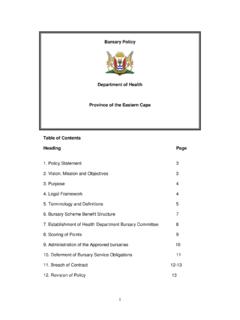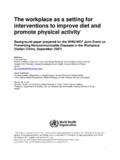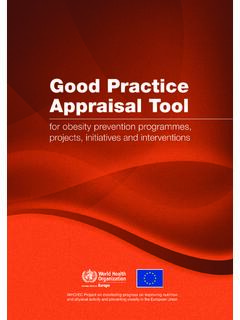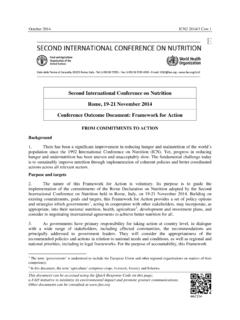Transcription of If it’s about Nutrition, ask your Dietitian. - ADSA > Home
1 Should you need the details of a registered dietitian in your area or email is a science and dietitians are the recognised experts in the field of evidence-based nutrition . There are many unscientific health and nutrition publications, fad diets and nutrition gimmicks around. When you consult with a registered dietitian, you are protected from misleading treatment and IS ADSA? The Association for Dietetics in South Africa (ADSA) is the professional organisation for registered s VISIONTo represent and develop the dietetic profession to contribute towards achieving optimal nutrition for all South s MISSIONAs the registered professionals in the field of dietetics and nutrition , we support and promote the continued growth of the profession of dietetics in South it s about nutrition , ask your dietitian!The primary aims of the Association are to serve the interests of dietitians in South Africa and promote the nutritional wellbeing of the DO DIETITIANS NEED TO BE REGISTERED?
2 Registration protects the public from nutrition law, dietitians need to keep up to date with the latest nutritional information in order to remain registered, ensuring that anyone who makes use of their services is given the latest evidence based registered dietitians will gladly provide proof of registration upon request. In fact, you should ask to see proof of registration with the HPCSA when you see anyone claiming to be a nutrition (SA) is the notation used for registered dietitians in South IS A NUTRITIONIST?A nutritionist is responsible for the promotion of nutrition health and well-being and prevention of nutrition related disorders of groups or populations, throughout the various stages of the life cycle. However, unlike dietitians, nutritionists cannot provide therapeutic nutritional advice for medical nutritionist is also registered with the it s about nutrition , ask your CAN A DIETITIAN DO FOR ME?
3 Dietitians are the experts in weight management and nutrition . Obesity is only one of many nutrition -related conditions that dietitians can treat. The cornerstone of good health is sensible nutrition , and dietitians draw on science-based education and experience to provide food and nutrition services while helping individuals make positive lifestyle changes tailored to their unique needs. Whether therapeutic nutrition or preventative nutrition , dietitians promote good health and wellbeing for IS A DIETITIAN? A qualified health professional registered with the Health Professions Council of South Africa (HPCSA) who has a minimum qualification of a four year Bachelor er of Dietetics or Bachelor of Science in Dietetics degree or a two-year post-graduate nutrition and dietetics degree* with training in all aspects and fields of nutrition therapy Dietitians are the only qualified health professionals that qqassess, diagnose and treat diet and nutrition problems, both at an individual and at public health level.
4 Dietitians use the most up-to-date evidence on food, health and disease, which they translate into practical qqguidelines to enable people to make appropriate lifestyle and food choices. Dietitians mainly work in the following sectors and a number also work in research and management:PRIVATE PRACTISING DIETITIANS Consult clients/patients who need advice on nutrition ththerapy for their condition or need to make lifestyle changes which would include healthy eating.*For further information visit medical conditions managed by dietitians in private practice and hospitals Diabetes, heart disease (high blood pressure, high cholesterol), stroke, liver disease, kidney disease cancer, HIV/AIDS, TB, throat, stomach and intestinaln disorders (inflammatory bowel disease (IBS), Crohn s, ulcerative colitis, diverticulitis, constipation, flatulence, diarrhoea) Food allergies and intolerances Eating disordersDietitians are also trained in providing specialised nutritional advice for.
5 Sports nutrition The various stages during a person s lifecycle, pregnancy, infancy, childhood, adulthood, the elderlyCLINICAL DIETITIANSM ainly work in a hospital setting (in both the private and public sectors) where they consult patients referred by doctors and other health care staff, assessing and individualising nutrition therapy as an integral part of the patient care team and prescribing an appropriate special diet, tube feed or intravenous feedCOMMUNITY DIETITIANS Work in the public sector but may also be employed by non-governmental or community based organisations Focus on promotive, protective and supportive community nutrition interventionsCommunity nutrition Focus Areas Promotion, protection and support of breast feeding nutrition through the lifecycle Growth monitoring and promotion Monitoring of nutrition indicators nutrition education and counselling Promotion of healthy lifestyles to address non- communicable diseases nutrition supplementation for malnutrition Community-based outreach activities CONSULTING DIETITIANS Offer their expertise in the field of nutrition to the food, nutrition , healthcare and pharmaceutical industries.
6 They also often provide input to the media on nutrition -related topics. Advise their clients on: - Current food labelling legislation, nutrition regulations and conduct nutritional analyses of food items - Product development - The latest developments and trends in nutrition - nutrition -related marketing activities - Literature reviewsFOOD SERVICE MANAGEMENT DIETITIANS Manage the provision of healthy and specialised diets to persons in various institutions such as health care facilities, correctional services, welfare care settings, school hostels and old age homes Plan, cost and develop menus Control, implement, evaluate and oversee food service systems including the purchasing, storage, preparation and serving of foods and beverages










